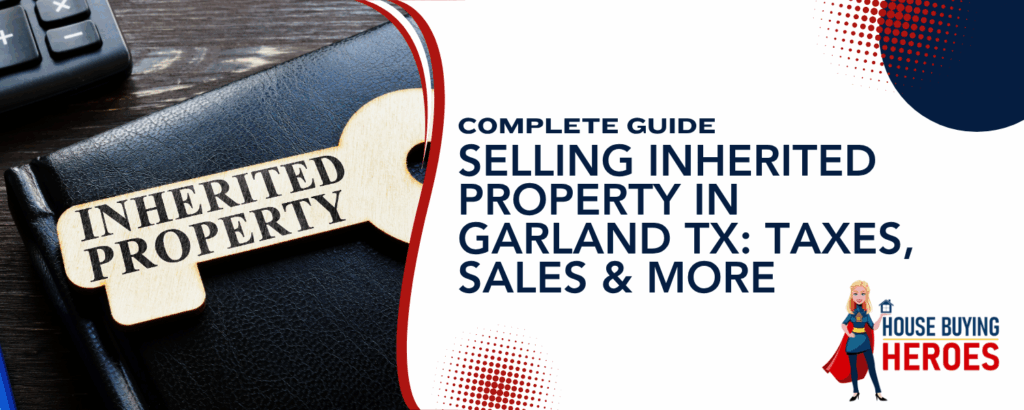
There are numerous legal issues, house preparation, and tax considerations to consider when selling inherited property in Garland, TX. This complete guide will help you make smart decisions throughout the process by clearing up any confusion. If you’re selling something or just looking around, the sales and tax rules in Texas will have an effect on your success. We show you how to handle inherited property cost-effectively by breaking down probate processes and clever sales methods.
Understanding Inherited Property in Garland, TX
In the Garland, Texas area, inheritance comes with its own set of problems and opportunities. Everyone who is involved needs to know a lot about everything, from how to understand inheritance definitions to how to get through probate court. Probate must be done before an estate’s assets may be legally given to the correct heirs. To transfer an inheritance quickly and easily, you need to know a lot about inherited property and the probate process. Understanding Inherited Property in Garland, TX This section will help heirs make smart decisions about their new possessions by explaining these important topics.
| Aspect | Details | Implications | Considerations |
| Legal Framework | Texas probate laws | Complete the necessary paperwork | Consult legal expertise |
| Tax Obligations | Property taxes and inheritance tax | Potential financial impact | Plan for tax payments |
| Property Valuation | Market value assessment | Determines tax basis | Professional appraisal recommended |
| Ownership Transfer | Title change requirements | Ensures legal ownership | Complete necessary paperwork |
| Maintenance Responsibilities | Upkeep and repairs | Preservation of property value | Budget for regular maintenance |
This table encapsulates the multifaceted aspects of managing inherited property within the Garland context.
What is Inherited Property?
When the owner dies, the heirs acquire the property. Beneficiaries may be entitled to a home, real estate, or other assets, depending on the state’s inheritance laws or the terms of a will. Heirs need to know what inheritance is since it has mental, monetary, and legal value. The fair market value of real estate in Garland, Texas, as of the date of death, is what determines its inheritance value. Valuation is very important since it has an effect on both taxes and probate. You can pass down land, buildings, and enterprises from one generation to the next. Each inherited property has a varied importance when it comes to probate and estate planning, depending on its structure. The next step after getting an inheritance is to decide what to do with the property: keep it, sell it, or rent it out. Before making any choices, the heirs should look into the value of the estate, their duties, and the existing and future state of the market.
Heirs should think about more than just the practical aspects of inheritable goods; they should also think about how much they care about them. Some people consider these estates as more than just land or buildings because of their family history and personal ties. Heirs must know how complicated inheritance laws are. The stepped-up basis notion is important for capital gains taxes, and people who inherit assets must keep this in mind when they file their federal and state tax forms. You can avoid problems by making smart choices about whether to sell the house or retain it in the family. To make smart choices that help you and your family reach your goals, you need to know how inheriting property will affect your emotions, finances, the law, and other areas of your life.
The Role of Probate Court in Inheritance

The probate court is in charge of managing a person’s estate. The probate procedure includes accepting a will, paying off debts, and dividing up the estate’s assets among the heirs. The probate court in Garland, Texas, handles estates that belong to both private and public people. Before the procedure can begin, the local probate court must get the will. If there is no will, the court appoints an administrative officer or executor to take care of the estate. Pay off any taxes, liens, or obligations on the property you inherited to make sure the assets are free and clear. Finding out how much an estate is worth and paying off debts are two of the most critical things to do in probate. During this important time, the rates of taxes and the way wealth is shared change. The market value of a property influences both the estate tax and the heirs’ decision about whether to sell or keep the property.
You can avoid probate by making simple bequests with defined beneficiary contracts or shared tenancy. Probate is a long legal process that often brings up family arguments about how to divide up assets. An estate planning lawyer can help you with probate or keep your inheritance safe. Probate makes it easier to make claims on an estate and protects beneficiaries from unexpected financial problems. Beneficiaries should know about their inherited rights so they can protect their own interests. The probate court makes sure that fair succession processes happen by paying off debts and confirming (or not) wills. Following the rules and making plans are important for successful Garland probate. Heirs can get through these problems and pass on their fortune without a hitch by hiring good legal and financial consultants. Heirs should grasp how the probate court works so they can protect their inheritance or make money from selling inherited property.
Selling Inherited Property: Key Considerations
It’s never easy to deal with the emotional, legal, and financial parts of selling inherited property. These attributes can help you have better success in a lot of areas, like figuring out the optimum time to sell and getting past common problems. Because estate planning and market dynamics are so crucial in Garland, Texas, every occurrence has big effects. Heirs may find it helpful to look into the advantages and cons of selling to pay their respects and meet their financial obligations. This essay talks about important things to think about when selling inherited property. If you want to minimize holding costs or avoid rising property taxes on your inherited property, selling quickly to a cash home buyer in Garland, TX can help you close fast and reduce ongoing financial burdens. Contact us for more details.
When to Sell Inherited Property
Time has an effect on both money and emotions, which is why selling inherited property in Garland, TX, is so important. Understanding the present status of the market is very important. You should keep a watch on the real estate market in Garland, TX, since you could be able to make more money if you sell when the market is good for sellers. Mortgage rates, demand for houses, and the state of the economy in general are all things that could help you figure out when is the best time to sell. When thinking about the estate’s long-term growth and the capital gains tax effects, it’s necessary to compare the possible benefits of an early sale to some heirs with those. It is very important to make a will here. When properties are tied to family memories, it might be harder to plan. Remember that many heirs need time to grieve before they can sell, since it’s hard to let go.
People who work in finance and real estate can help people get their subjective anxieties in line with objective market data. If an estate goes through probate, it could take longer to sell. After probate, heirs will be able to make smart sales decisions without any legal doubt. Legal liabilities, such as overdue property taxes, can also affect schedules. Once the costs of probate have been paid, the heirs can move on. When these things are used in real estate, they can help Garland’s sales be more emotionally and financially successful. Knowing the tax effects and stepped-up basis might help you make timing decisions that are better for your finances. Taking these things into account during the settlement process can help heirs pay their fair share and honor the family’s history.
Common Challenges and Solutions in Selling Inherited Property
When selling inherited property, you need to be very careful because there are a lot of complications that might happen. Managing taxes is not easy. Knowing how capital gains taxes would affect the selling profits could have a big impact on the heirs’ net gain. The stepped-up basis lowers taxable gain and taxes by bringing the property’s value up to its market value after the original owner dies. Tax professionals will make sure that heirs take care of these things. Heirs also have a lot of trouble when family members disagree or fight over wills. The probate court may need to become involved if there are disagreements in the family about the sale. Proactive estate planning, such as making clear wills and keeping lines of communication open, can help reduce the risks of litigation. Using a mediator and these tactics might make the deal go better and help people make better decisions. Wear and tear can also make inherited property less valuable. Before you put your property up for sale, fix or improve everything that needs it.
Real estate experts in Garland, TX, are experts in showing off upgrades in a way that makes people want to buy houses in Texas. Promote the estate’s unique attributes to certain groups of people to raise its value. Last but not least, if you have strong emotional attachments to your home, it may be hard to sell it quickly. Family group talks and emotional counseling could be useful. You might choose to stay or sell based on your finances and how you feel. This could give away your ambitions for the future. By immediately dealing with these problems and coming up with appropriate solutions, you can make the selling process easier, less stressful, and more profitable. If you know a lot about finance, legal, and real estate, you can make a difficult transition work for you.
Tax Implications of Selling Inherited Properties
When you sell property that you inherited, you need to know a lot about tax rules. Heirs in Garland, Texas, should know a lot about capital gains and estate taxes. You need to grasp how the stepped-up basis affects the agreement if you want to pay less in taxes. Heirs can sell property they got from someone else and know what the tax effects will be. This article goes into detail about the key tax difficulties that come up when you inherit property and the stepped-up basis notion.
Understanding the Stepped-Up Basis
You need to know what a stepped-up basis is to appreciate the tax effects of selling property you inherited. When the original owner dies, the value of the property is changed to reflect what it is worth on the open market right now. This is a big deal since it affects capital gains taxes. If you sell a home you inherited, the stepped-up basis can help you lower the amount of tax you have to pay on the gain. If the property’s market worth is higher than the purchase price, the stepped-up valuation lowers gains. For instance, if you inherited a $300,000 house that was worth $500,000 when the owner died, the stepped-up basis would be $500,000. If you sold for $550,000, you would only have $50,000 in taxable gain instead of $250,000. This law could lead to big cuts in capital gains taxes.
When heirs in Garland, Texas, sell an inheritance, they have to think about this benefit. You might want to talk to a tax specialist to see if the stepped-up basis applies to the property. Our skilled counsel lowers fines by maximizing tax benefits. The stepped-up basis may change when sales happen in order to lower taxes for heirs and raise profits. When people understand how important it is, they make better choices and plans for their estates.
When you file your taxes following a transaction, you have to utilize the stepped-up basis. The heirs can avoid penalties and stay in conformity with tax laws if they declare the change in value. You need to know a lot about taxes because of the complicated structure. These professionals can help you figure out how inheritance taxes work, make all the right deductions, and meet all the deadlines. This method is good for real estate deals since it makes things better for heirs who have to deal with inherited properties and makes things less stressful for them.
Key Tax Implications to Consider

People who inherit property and want to sell it need to know about taxes. The capital gains tax issue is a big one. The difference between the selling price and the stepped-up basis is used to determine the amount of capital gains tax to charge on real estate sales. To avoid unpleasant tax shocks, you need to know how capital gains taxes work and plan. If a home is sold for more than the stepped-up appraisal, the gains that are liable to tax can be very large. To fully understand this gain, you need to know both the estate’s inherited value and the present situation of the market.
It is important to think about capital gains and estate taxes. When someone sells an estate, they have to pay estate taxes, which lowers their earnings. Paying close attention to these taxes can help you make a precise plan for your tax return. Before the sale, estate planning is needed to understand the tax consequences. To make legal and efficient transactions, heirs need to know about federal and state tax laws.
Another crucial thing to think about is how joint ownership or probate affects tax obligations. If you inherited the property together, split the capital gains and inheritance taxes. More paperwork proving ownership and tax liabilities is needed for probate to move forward. Because of how complicated it is, you need to consult with real estate and inheritance tax professionals in Garland, Texas.
Long probate processes or abrupt changes in the market might cause property taxes to go up. Heirs should contact a probate and estate tax professional to help them avoid these risks. These professionals can help you get the most money from your sales by telling you about tax breaks and maintenance breaks. These skilled solutions can assist heirs in managing and transferring property ownership without any financial or administrative problems. The heirs should think carefully about the possible tax effects of selling the house they got from their parents. They can choose to do any of the following:
If you want to know how inheritance tax rules will affect your agreement, you should talk to a tax professional.
- To figure out the stepped-up basis of the property for capital gains tax purposes.
- Consider employing installment sales to spread out your capital gains.
- If you want to lower the amount of your estate that will be taxed, consider giving away some of your property.
Think about whether inherited property would be eligible for any tax cuts or exemptions. One way to put off paying capital gains tax is to do a 1031 exchange.
You must keep careful records of all the work and money you spend on the property. If heirs keep these ideas in mind, they will be better able to grasp the financial system and use it to their benefit.
Steps to Successfully Sell Inherited Real Estate
Planning ahead is the best way to maximize your profits and avoid trouble when selling inherited property in Garland, Texas. This process requires handling a lot of paperwork, knowing how probate works, and being aware of the big tax consequences. Getting all the necessary paperwork together and talking to financial and legal specialists is important to make sure the transaction goes well. With the right counsel and procedures, the property will sell quickly and for a good price. If you plan beforehand, selling property you inherited can be a delightful experience that turns problems into chances.
Essential Documents for Selling Inherited Property
When you sell property that you got from someone else, you need to have the right documents. It’s crucial to organize these papers correctly so that the estate transfer can happen legally and the sale can go smoothly. The property deed is important and necessary since it shows who owns the property. It doesn’t matter if the assets are in a trust or an estate; this is very important. The market value of the property affects the asking price and the taxes that need to be paid, so a new assessment is needed. You need an appraisal to find out the market value and the capital gains tax level for a property you inherit. The probate records show that the estate was managed correctly and that the heir can sell the property. Probate often requires court hearings, so heirs should retain competent lawyers to speed things along.
The heirs should get the property tax receipts and the seller’s disclosure form. Tax receipts show that the buyer has paid their taxes on time, which eases their worries. The seller has told the buyer about any problems with the property, such as zoning rules and structural problems, to avoid going to court. You could need a will or an inheritance plan, to be more specific. These papers spell out how assets will be divided among successors and can help settle disagreements by making ownership and rights clear.
A recorded selling agreement makes real estate deals clearer. This agreement with potential buyers lists the closing date, sale price, and terms. A real estate lawyer and a financial advisor should look over this arrangement to find flaws and work out the benefits. Working with these specialists can make inheritance property transactions faster and easier to follow the rules set by the market and the law. Taking care of this paperwork makes the sale go smoothly and protects heirs from any problems that may come up after the sale, which means more money.
Practical Tips for a Smooth Sales Process

When passing on property through inheritance, it’s important to plan and pay special attention to the details. First, learn about the real estate market in Garland, Texas. The heirs might be able to get a higher price for the home by keeping an eye on what’s going on in the market and selling when it’s good. It could be good to find a real estate agent who works with homes that people have inherited. They know a lot about the local market and can help you set a fair price. Experts claim that cleaning and organizing your house will make it more appealing to purchasers. Well-staged images that show off the best features of a home can help it sell faster.
Another important part of the bargain is paying your taxes early. When you sell an inherited home, you need to think about how much money you will have left over after paying the stepped-up basis and capital gains tax. When successors get early tax advice, they are better able to handle these responsibilities and pay less in taxes. You might want to learn about stepped-up basis and other ways to organize your estate. These parts are made ahead of time to avoid any last-minute problems that could affect the income from the transaction or cause delays.
Feelings are important, but they shouldn’t get in the way of logic and reason if you know how to handle them. To keep sales from going down, heirs should discuss things out honestly and openly. It is best to hire a lawyer or mediator to help with the talks so that everyone stays objective. Offering buyers flexible terms can speed up discussions and make it easier for them to walk away from a contract. Doing little repairs, paying closing costs, or setting a reasonable closing date will make the house more appealing and cut down on talks.
To have a great sales career, you need to use these ideas along with strategic planning. Heirs can transform problems into chances by taking charge of the sales process ahead of time, from paperwork and market research to taxes and getting ready emotionally. When the correct information and resources are deployed, the deal goes through without a hitch thanks to good planning and execution.
If you want to sell a house you inherited, you need to know about the Garland, Texas, market, tax laws, and your options. You can sell your home individually, through an agent, or to investors. Each option has its own benefits and cons. You should chat to a tax expert and an experienced real estate agent in your region if you want to make the most money while staying within the rules. You can sell the house without hurting its history if you think ahead and exercise excellent judgment. Frequently asked questions lead to useful knowledge.
What is the probate process for inherited property in Garland, TX?
During probate, the testator’s will is verified, the estate’s debts are paid, and the heirs get any assets that are left over. This could include figuring out how much debt and property are worth and taking care of legal inheritances.
How does the stepped-up basis impact the sale of inherited property?
The stepped-up basis raises the property’s value to market value once the owner dies, which lowers capital gains taxes. The stepped-up basis means that you will still have to pay taxes on the $500,000 difference, even if the house was only worth $300,000 when you got it.
What documents are needed to sell an inherited property?
The property deed, an up-to-date appraisal, tax receipts, records of probate, a seller’s disclosure form, and, in some cases, a will or an inheritance agreement are all needed. These prove that the transfer of property and the handling of estates are legal.
What are the common challenges faced when selling inherited property?
Taxes, controversial wills, and family fights are just a few examples of problems that could come up. The value of the estate could go down if the property worsens. Tax advice, mediation services, and repair money are quite important.
How can emotional aspects influence the sale of inherited property?
It could be challenging to sell a house because of how you feel. Heirs might need some time and space to mourn and talk about what happened. Working with specialists in real estate and finance might help you find a balance between these urges and market worries.
Helpful Garland, TX Blog Articles
- Selling A House With Code Violations In Garland, TX
- How Long Should It Take to Sell a House in Garland, TX
- How to Sell a House with Tenants Not Paying Rent in Garland, TX
- Taxes When Selling an Inherited House in Garland, TX
- Selling a House As-Is in Garland, Texas: Do You Need an Inspection?
- Tips for Selling an Old Home in Garland, TX
- Can You Sell a House with Property Taxes Owed in Garland, TX?
- Paperwork for Selling a House by Owner in Garland, TX
- Can I Sell My House to My Son Below Market Value in Garland, TX?


